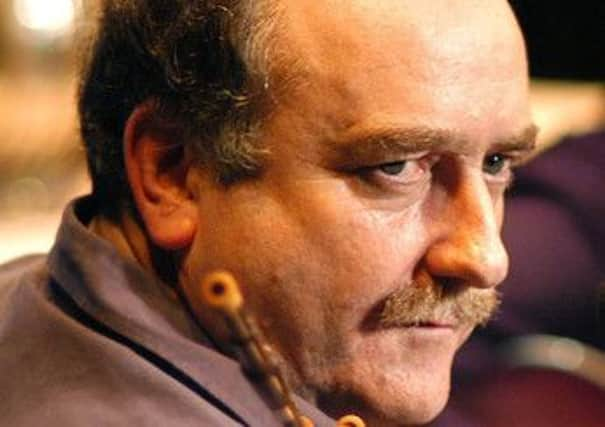Bagpipes set to sound at Bannockburn commemoration


Musicologists tell us that the earliest known records of bagpipes in the British Isles are English, dating from the 13th and 14th centuries; they don’t appear in Scots written records until the 15th century.
This may disappoint devotees of the Mel Gibson school of Scottish history, but it certainly hasn’t deflected Allan MacDonald, a master piper, composer and scholar of Gaelic musical culture, in creating what promises to be an epic piece of music, The Bruce 700, commissioned by Stirling Council to commemorate the forthcoming 700th anniversary of the battle.
Advertisement
Hide AdTo be premiered at Stirling’s Albert Halls on 26 June, the piece, composed by MacDonald in collaboration with cellist and arranger Neil Johnstone, brings together some leading pipers and other traditional musicians with a schools pipe band and other amateur players.
If any instruments were heard during the battle of Bannockburn, they were most likely to have been horns, MacDonald explains. What he has done, however, to mark this most celebrated of Scottish battles at such a pivotal time in Scotland’s history, is to eschew any period instrument approach and use his own musicality and knowledge to create a piece which evokes the violence, tragedy and triumph of the conflict.
Some 50 musicians will be involved, including MacDonald himself and other top-level pipers including his brother, Dr Angus MacDonald, as well as other well known Scottish folk names on fiddles, cellos, harp, saxophone and percussion and singers Kathleen MacInnes, Griogair Labhraidh and Rod Paterson. They will be joined by the Tolbooth fiddle group and the Stirling and District Schools Pipe Band.
MacDonald pays tribute to Johnstone – a cellist steeped in pipe music through his piper father, the late, great Duncan Johnstone – who has orchestrated the hour-long work. There are plans for it to be performed at Celtic Connections and MacDonald would love it to be played in tandem with The Suite for Alan, which Johnstone composed around a piobaireachd lament written by his father.
For The Bruce 700, MacDonald, 58, has drawn upon his own expertise in the realms of piobaireachd – “some of the earliest music we have” – and has incorporated a 16th-century example, The Unjust Incarceration, known to have been written by the famous blind piper of Gairloch, Iain Dall MacKay. “So it does reach back towards that period,” says MacDonald, “if perhaps pretty intangibly.” By the same token, he adds, “We talk about Robert the Bruce, this man of Scottish independence, but our concept of Scotland is very far from anyone’s at that time.
“Bruce was of Norman descent, but his great grandfather was an O’Neill, which perhaps explains why he had designs on Ireland, this concept of a unified kingdom of Scotland and Ireland. But of course he was also well in with the English aristocracy.”
Advertisement
Hide AdApart from the piobaireachd, MacDonald has incorporated a brosnachadh – a traditional Gaelic incitement to battle, then a lengthy sequence, ‘The Uprising’, which evokes the battlefield mayhem, followed by keening. “I’m using all the modalities of the pipe scale,” he says, “to show the riches of the instrument, but also to suggest the different factions who ultimately supported Bruce.”
He and three other lead pipers will be playing pipes in the key of A, in which Highland pipes tended to be pitched before standardisation into B flat by the pipe band movement. When these pipes give way to the pipe band, the half tone shift, he says, should have additional dramatic effect.
Advertisement
Hide AdAlso incorporated into the piece is Robert Burns’s Scots Wha’ Hae, the tune of which, Hey Tutti Tatti, is held by tradition to have been played at Bannockburn. Certainly it seems to have been sung by Joan of Arc’s Scots archers as they entered Orleans in 1429.
He ends with a song he has written to an old Irish tune, The Battle of Arganmore – “a simple, strong melody that always affected me. After celebrating war I’m saying, ‘Hold on, we’re into the 21st century, we’re needing to look at the world and at ourselves and change our psyche and our whole way of thinking.’”
Far from audiences leaving in a state of do-or-die belligerence, “they’ll be hugging each other,” he laughs. They certainly won’t leave unmoved.
• The Bruce 700 is at the Albert Halls, Stirling, on 26 June. See http://tolbooth.stirling.gov.uk